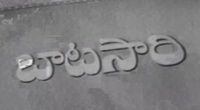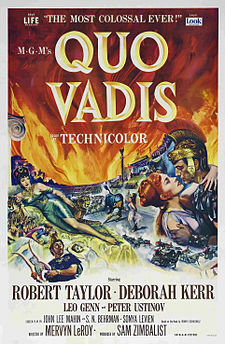Quo Vadis (Latin for "Where are you going?") is a 1951 American epic film made by Metro-Goldwyn-Mayer in Technicolor. It was directed by Mervyn LeRoy and produced by Sam Zimbalist, from a screenplay by John Lee Mahin, S.N. Behrman and Sonya Levien, adapted from the novel Quo Vadis (1896) by the Polish Nobel Laureate author Henryk Sienkiewicz. The score is by Miklós Rózsa and the cinematography by Robert Surtees and William V. Skall. The title refers to an incident in the apocryphal acts of Peter.
| Quo Vadis | |
|---|---|
theatrical release poster | |
| Directed by | Mervyn LeRoy |
| Produced by | Sam Zimbalist |
| Screenplay by | S. N. Behrman Sonya Levien John Lee Mahin |
| Based on | Quo Vadis by Henryk Sienkiewicz |
| Starring | Robert Taylor Deborah Kerr Leo Genn Peter Ustinov |
| Narrated by | Walter Pidgeon |
| Music by | Miklós Rózsa |
| Cinematography | Robert Surtees William V. Skall |
| Edited by | Ralph E. Winters |
| Distributed by | Metro-Goldwyn-Mayer |
Release date |
|
Running time | 171 minutes |
| Country | United States |
| Language | English |
| Budget | $7.6 million |
| Box office | $21 million |
The film starred Robert Taylor, Deborah Kerr, Leo Genn, and Peter Ustinov, and featured Patricia Laffan, Finlay Currie, Felix Aylmer, and Abraham Sofaer. In addition, Sophia Loren and Carlo Pedersoli appeared as uncredited extras. Sergio Leone assistant directed the Italian cast members. The film was nominated for eight Academy Awards (though it won none), and was such a huge box-office success that it was credited with single-handedly rescuing MGM from the brink of bankruptcy.
Screenplay
The story, set in ancient Rome during the final years of Emperor Nero's reign, 64–68 AD, combines both historical and fictional events and characters, and compresses the key events of that period into the space of only a few weeks. Its main theme is the Roman Empire’s conflict with Christianity and persecution of Christians in the final years of the Julio-Claudian line. Unlike his illustrious and powerful predecessor, Emperor Claudius, Nero proved corrupt and destructive, and his actions eventually threatened to destroy Rome's previously peaceful social order.
Marcus Vinicius (Robert Taylor) is a Roman military commander and the legate of the XIV Gemina. Returning from the wars, he falls in love with Lygia (Deborah Kerr), a devout Christian, and as a result, finds himself increasingly drawn to her religion. Though she grew up Roman as the adopted daughter of Aulus Plautius (Felix Aylmer), a retired general, Lygia is technically a hostage of Rome. Marcus persuades Nero (Peter Ustinov) to give her to him as a reward for the services he has rendered. Lygia resents this arrangement, but nevertheless falls in love with Marcus.
Meanwhile, Nero's atrocities become increasingly outrageous and his behavior more irrational. After Nero burns Rome and blames the Christians, Marcus sets off to rescue Lygia and her family. Nero captures them, along with all the Christians, and condemns them to be killed in the arena. However, Petronius (Leo Genn), Marcus's uncle and Nero's most trusted advisor, warns him that the Christians will be made martyrs. Then, tired of Nero's insanity, and suspecting that Nero may be about to turn on him too, Petronius composes a letter to Nero expressing his derision for the emperor (which he previously had concealed to avoid being murdered by him) and commits suicide by severing an artery in his wrist. Marcus is arrested and sent to prison for his efforts to save Lygia. Saint Peter (Finlay Currie) also has been arrested and imprisoned after returning to Rome in response to a sign from the Lord, and Peter marries the couple. Peter is later crucified upside-down, a form of execution conceived of by Nero’s guard as an expression of mockery.
Poppaea (Patricia Laffan), Nero's wife, who lusts after Marcus, devises a diabolical revenge for his rejection of her. Lygia is tied to a wooden stake in the arena. A wild bull is also placed there, and Lygia's bodyguard Ursus (Buddy Baer) must try to kill it with his bare hands, otherwise Lygia will be gored to death. Marcus is tied to the spectator's box and forced to watch, much to the horror of his officers, who also attend the spectacle. When all seems hopeless, Ursus is able to break the bull's neck. Hugely impressed by Ursus's courage, the crowd exhorts Nero to spare them. The emperor refuses to do so, even after four of his retainers Seneca (Nicholas Hannen), architect Phaon (D.A. Clarke-Smith), poet Lucan (Alfredo Varelli), and Terpnos (Geoffrey Dunn) add their endorsement of the mob's demands by putting their thumbs up as well. Marcus then breaks free of his bonds, leaps into the arena, frees Lygia with the help of the loyal troops from his own legion, and announces that General Galba is at that moment marching on Rome, intent on replacing Nero.
The crowd revolts, now firmly believing that Nero, and not the Christians, is responsible for the burning of Rome. Nero flees to his palace, where he strangles Poppaea to death, blaming her for attempting to scapegoat the Christians. Then Acte (Rosalie Crutchley), a palace slave who was once in unrequited love with Nero, appears and offers to aid him in ending his own life before the mob storms the palace. Nero can not do it, so Acte helped him, helping him to push the dagger into his chest.
Marcus, Lygia and Ursus are now free and leave Rome. By the roadside, Peter's crook, which he had left behind when he returned to Rome, has miraculously sprouted flowers. The radiant light intones, "I am the way, the truth, and the life," words reported to have been spoken by Jesus (John 14:6, New Testament).
- Robert Taylor as Marcus Vinicius
- Deborah Kerr as Lygia
- Leo Genn as Petronius
- Peter Ustinov as Nero
- Patricia Laffan as Poppaea
- Finlay Currie as Peter
- Abraham Sofaer as Paul
- Marina Berti as Eunice
- Buddy Baer as Ursus
- Felix Aylmer as Plautius
- Nora Swinburne as Pomponia
- Ralph Truman as Tigellinus
- Norman Wooland as Nerva
- Peter Miles as Nazarius
- Geoffrey Dunn as Terpnos
- Nicholas Hannen as Seneca
- D. A. Clarke-Smith as Phaon
- Rosalie Crutchley as Acte
- John Ruddock as Chilo
- Arthur Walge as Croton
- Elspeth March as Miriam
- Strelsa Brown as Rufia
- Alfredo Varelli as Lucan
- Roberto Ottaviano as Flavius
- William Tubbs as Anaxander
- Pietro Tordi as Galba
- Clelia Matania as Parmenida
The musical score by Miklós Rózsa is notable for its attention to historical authenticity. Rozsa incorporated a number of fragments of ancient Greek melodies into his own choral-orchestral score. New recordings were made by Rózsa with the Royal Philharmonic Orchestra (1977) and by Nic Raine, conducting the City of Prague Philharmonic (2012). At the end of the film, a triumphal march heralds the success of the armies of future emperor Galba. This theme would be re-used by Rózsa in Ben-Hur (1959) as the music accompanying the parade of the chariots around the track, prior to the famous chariot race.
- The film was originally cast in 1949 with Elizabeth Taylor as Lygia and Gregory Peck as Marcus Vinicius. When the production changed hands the following year, the roles went to Deborah Kerr and Robert Taylor. Elizabeth Taylor was also a Christian prisoner in arena, but uncredited.
- Clark Gable turned down the role of Marcus Vinicius because he thought the costume would make him look ridiculous.
- Sophia Loren briefly appears uncredited as a slave. The Italian actor Bud Spencer also had an uncredited extra role as a Praetorian Guardsman.
- Audrey Hepburn, then still widely unknown when the film was released, was considered for the part of Lygia. The studio wanted to use an unknown but the role went to Deborah Kerr instead. Photos of her in costume for the film still exist.
- Produced for $7 million, the film was MGM's largest grosser since Gone with the Wind (1939)
- The film holds a record for the most costumes used in one movie: 32,000.
- The film was shot on location in Rome and in the Cinecittà Studios.
- Peter Ustinov relates in his autobiography Dear Me that director Mervyn LeRoy summarized the manner in which he envisioned Ustinov should play the Emperor Nero, very salaciously, as "Nero...He plays with himself, nights." Ustinov, getting the director's gist, thereafter notes that this depraved manner was the basis of his creation of the character of Nero for the film.
- Also according to Ustinov, the film originally was slated to be directed by John Huston. Ustinov screentested with Huston before the production changed hands.
- At one point in the film Nero shows his court a scale model illustrating his plans for rebuilding Rome. This model originally was constructed by Mussolini's government for a 1937 exhibition of Roman architecture—the film's producers borrowed it from the postwar Italian government.
- The first use of the phrase 'Hollywood on the Tiber', which has come to refer to a golden era of American runaway film production in Italy, was used as the title of an article in the June 26, 1950 issue of Time.
- In his memoir Dear Me (1981), Ustinov recalled that MGM had sought him for the role of Nero, but dithered for months, refusing to commit. During this time, he received numerous telegrams from the studio, one of which stated that they were concerned that he might be too young
Watch movie Quo Vadis 1951 Film online on Amazon
Watch movie Quo Vadis 1951 Film online
Watch The Movie On PrimeShradhanjali Full HD Movie Download

Habari Full HD Movie Download

Jagir Full HD Movie Download

Rokkk Full HD Movie Download

Karma Full HD Movie Download

Prem Tapasya (1983) Full HD Movie Download
.jpg)
Hadh: Life On The Edge Of Death Full HD Movie Download

Satyameba Jayate Full HD Movie Download

Kaminey Full HD Movie Download

Antham Full HD Movie Download

Amalapuram Alludu Full HD Movie Download

Police Inspector Full HD Movie Download

Papam Pasivadu Full HD Movie Download

Thulli Thirinda Kaalam Full HD Movie Download

Kodanda Ramudu (2000) Full HD Movie Download
.jpg)
Harry Potter and the Chamber of Secrets Full HD Movie Download

Wild Wild West Full HD Movie Download

Subhavaartha Full HD Movie Download

Security Full HD Movie Download

Baata Sari Full HD Movie Download

Indru Poi Naalai Vaa Full HD Movie Download

Download latest Movie from bollywood
- 1> baaghi 3
- 2> THE SKY IS PINK MOVIE FULL STORY AND REVIEW
- 3> Luka Chuppi
- 4> TO ALL THE BOYS I’VE LOVED BEFORE
- 5> Kabir Singh
- 6> Street Dancer 3D
- 7> Simmba
- 8> Gone Girl
- 9> The Girl Who Lived
- 10> Ludo
- 11> DILWALE DULHANIA LE JAYENGE
- 12> GUILTY
- 13> The Godfather
- 14> Adventures of Rusty
- 15> Sooryavanshi
- 16> Satyameva Jayate 2
- 17> Thappad
- 18> Bhool Bhulaiyaa 2
- 19> KGFChapter 2
- 20> Mardaani 2
- 21> Pinjar
- 22> Shivaji maharaj
- 23> Ek Villian 2
- 24> Hungama 2
- 25> Divergent
- 26> Mumbai Saga
- 27> The Internship
- 28> HIT (telugu)
- 29> Panga
- 30> The perfect date
- 31> 16 December
- 32> Gopala Gopala (Telugu)
- 33> Brahmastra
- 34> Gangubai Kathiawadi
- 35> Manmadhudu
- 36> Nenu local
- 37> Mahanati
- 38> Shatamanam bavathi
- 39> Lagaan
- 40> After
- 41> MOM
- 42> Shamshera
- 43> Raguvaran BTech
- 44> Khakee
- 45> The villain
- 46> OM
- 47> Mr. perfect
- 48> Bueatifull mind
- 49> Hichki
- 50> Gabbar Singh
- 51> Jogi
- 52> Before Sunrise
- 53> Before Sunset
- 54> Before Midnight
- 55> The Big Bull
- 56> Top Gun: Maverick
- 57> The Purge
- 58> The Sky is Pink
- 59> Laxmmi Bomb
- 60> Sadak 2
- 61> Sufna
- 62> Prithviraj
- 63> PK
- 64> Coolie No 1(2020)
- 65> Black Widow
- 66> Dear Zindagi
- 67> Dil Bechara
- 68> PHIR HERA PHERI
- 69> WAR
- 70> Dostana
- 71> RRR: Roudram Ranam Rudhiram
- 72> Maidan
- 73> Dabbang 3
- 74> Chhalaang
- 75> life as we know it
- 76> SherShaah
- 77> Sandeep Aur Pinky Faraar
- 78> Event Horizon
- 79> 83
- 80> Radhe: Your Most Wanted Bhai
- 81> Gunjan Saxena: The Kargil Girl
- 82> Mr India
- 83> Vivah
- 84> Anokha Bandhan
- 85> Ghost
- 86> Bhoot: Part One - The Haunted Ship
- 87> Haseen Dilruba
- 88> Laal Singh Chaddha
- 89> Qismat
- 90> Rajput
- 91> Drive
- 92> Dil Chahta Hai
- 93> Dil Ki Baazi
- 94> Dil Ka Rishta
- 95> Teesri Manzil
- 96> Dil
- 97> Love Aaj Kal
- 98> Khaali Peeli
- 99> Bunty Aur Babli 2
- 100> Atrangi Re
- 101> Gulabo Sitabo
- 102> Jodi
- 103> Suraj Pe Mangal Bhari
- 104> Deewana
- 105> Attack
- 106> Sardar Udham Singh
- 107> Toofan
- 108> THE LOVEBIRDS
- 109> Jersey
- 110> Ginny Weds Sunny
- 111> Thalaivi
- 112> Shiddat
- 113> Angels vs Zombies
- 114> Koi Mil Gya
- 115> Thank God
- 116> Bhuj: The Pride of India
- 117> Hum Aapke Hain Kaun
- 118> The Platform
- 119> Bird Box
- 120> Roohi Afzana
- 121> Torbaaz
- 122> Nikamma
- 123> World War Z
- 124> Extraction
- 125> Train to Busan
- 126> Life of Pi
- 127> SHAADI MEIN JROOR AANA
- 128> Himmat Aur Mehnat
- 129> To All The Boys: P.S. I Still Love You
- 130> Mimi
- 131> Good Newwz
- 132> Shubh Mangal Zyada Saavdhan
- 133> Raabta
- 134> Harry Potter and the Philosopher's Stone
- 135> Harry Potter and the Chamber of Secrets
- 136> Chhapaak
- 137> War of the Worlds
- 138> Harry Potter and the Prisoner of Azkaban
- 139> Harry Potter and the Goblet of Fire
- 140> MURDER MYSTERY
- 141> Shakuntala Devi
- 142> Bachchan Pandey
- 143> Jayeshbhai Jordar
- 144> Sheer Qorma
- 145> Saina
- 146> 'O' Pushpa I hate tears
- 147> Kedarnath
- 148> MS Dhoni The Untold Story
- 149> Chhichhore
- 150> Badhaai Ho
- 151> Unstoppable
- 152> Oz the Great And Powerful
- 153> The Girl on the Train
- 154> Haathi Mere Saathi 2020
- 155> The Conjuring: The Devil Made Me Do It
- 156> Gandhi Se Pehle Gandhi
- 157> The Song of Scorpions
- 158> Srimanthudu
- 159> Hello Guru Prema Kosame
- 160> Beauty and The Beast
- 161> Black Panther
- 162> Charlie and the Chocolate Factory
- 163> Bole Chudiyan
- 164> Fidaa
- 165> Duvvada Jagannadham
- 166> Bruce Lee: The Fighter
- 167> Hyper
- 168> Yaara
- 169> Red (2020)
- 170> Shivam
- 171> That Is Mahalakshmi
- 172> Nishabdham
- 173> Aashram 2020 web series
- 174> Laxmii
- 175> Mismatched
- 176> STUDENT OF THE YEAR 2
- 177> NAIL POLISH
- 178> Ramprasad Ki Tehrvi
- 179> KAAGAZ
- 180> 12 o Clock
- 181> The Power
- 182> bolo hau
- 183> Tribhanga
- 184> JAMUN
- 185> Madam Chief Minister
- 186> Maasaab
- 187> Aadhaar
- 188> Tanhaji
- 189> Bhaagi 3
- 190> Bhootnath
- 191> MALANG
- 192> Jai Mummy Di
- 193> Haathi Mere Saathi 2021
- 194> Shakeela
- 195> Unpaused
- 196> Annayya
- 197> Vamsoddharakudu
- 198> Mrugaraju
- 199> Narasimha Naidu
- 200> Sankranti
- 201> Manasu Maata Vinadhu
- 202> Anjaane
- 203> Apaharan
- 204> Bachke Rehna Re Baba
- 205> Bewafaa
- 206> Roohi
- 207> Radhe
- 208> Zindagi Khoobsoorat Hai
- 209> Yeh Mohabbat Hai
- 210> Yeh Kya Ho Raha Hai?
- 211> The Tomorrow War
- 212> DehradunDiary
- 213> Meri Shaadi Karaoo
- 214> Matruu Ki Bijlee Ka Mandola
- 215> No One Killed Jesica
- 216> Aag Ka Goola
- 217> Eight Million Dollars
- 218> Three Hundred
- 219> Cats and Dog
- 220> Decoy
- 221> Gold Rush
- 222> You Have Got Mail
- 223> Final Destination three
- 224> Tofan
- 225> Jungle
 Story of movie Quo Vadis 1951 Film :
Story of movie Quo Vadis 1951 Film : 